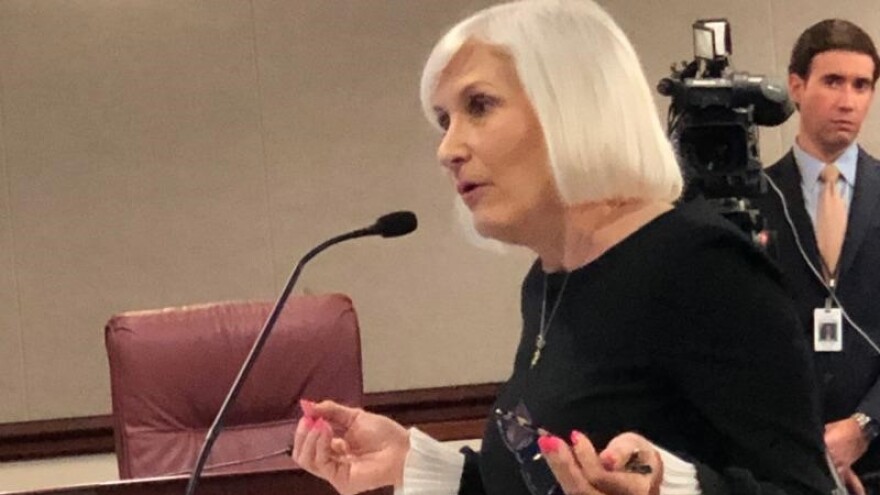Karen Leicht spent nearly three years in federal prison and three months on probation after pleading guilty to conspiracy to commit insurance fraud in 2010.
According to a judge and a former probation officer, Leicht’s sentence is over.
But the Miami paralegal may never be able to vote in Florida, despite the passage of a November constitutional amendment that “automatically” restored voting rights to most felons who’ve completed the terms of their sentences.
Under a bill approved Monday by the Senate Criminal Justice Committee, felons would have to pay all restitution before their voting rights could be automatically restored.
That would include paying in full restitution that’s been converted to a civil judgment, a provision Leicht --- who was ordered to pay $59 million in restitution --- told the panel would permanently disenfranchise her in Florida.
After she was released from prison and probation, the restitution obligation was converted to a civil judgment, which she continues to pay, Leicht said.
Senate Criminal Justice Chairman Keith Perry, a Gainesville Republican who supported the constitutional amendment, asked Leicht if she has registered to vote.
“No, I have not gone to register because I am saddled with $59 million of restitution, and I need to make sure that when I go and register to vote that I am not going to commit another crime because I am not going back inside,” she replied. “$59 million. Really? You think I can ever pay that? I’ll never vote in this state again, at this rate. That’s like a poll tax.”
The amendment, which appeared on the November ballot as Amendment 4, granted “automatic” restoration of voting rights to felons “who have completed all terms of their sentence, including parole or probation.” The amendment excluded people “convicted of murder or a felony sexual offense.”
State and local elections officials, clerks of courts, prosecutors and others have asked the Legislature for guidance in interpreting what specific crimes qualify as exceptions and what is required for felons to have completed their sentences. That has spurred a fierce debate in the Senate and House about how to carry out the amendment.
Leicht said voters approved Amendment 4, in part, to remove the vestiges of Jim Crow-era restrictions, such as poll taxes, that made it harder for black voters to cast their ballots.
Leicht said she feels shut out of the legislative process, because the first thing lawmakers ask is “are you a constituent.”
The Senate panel approved the bill on a 3-2, party-line vote after Sen. Jason Pizzo, a Miami-Dade County Democrat who is a former prosecutor, told Leicht not to worry.
The self-described “cat lady” lives in Pizzo’s district, he said.
“Go register to vote,” Pizzo said, adding that “the state attorney’s office is not going to prosecute you for checking off the box” because she is not intentionally trying to register to vote illegally.
“Oh my God, I’m shaking. That’s so incredible. Thank you so much,” she said.
Leicht’s situation was the most dramatic example of dozens of people who traveled to the state Capitol to plead with lawmakers to do nothing or to dramatically scale back House and Senate bills designed to carry out the amendment. Many amendment supporters do not believe the measure requires legislative action.
The House version (HB 7089) has drawn criticism, in part, because of its definition of felony sexual offenses, which includes a third-time prostitution conviction, and its treatment of felons’ financial obligations. Critics fear the definitions could prevent many people from ever getting to vote.
The Senate version, meanwhile, adds attempted murder to the disqualifying offenses.
But Monday’s meeting was dominated by complaints about the restitution payment issue.
Bill sponsor Jeff Brandes, R-St. Petersburg, relied on a video of Jon Mills, a former dean of the University of Florida law school and a onetime House Speaker, who told the Florida Supreme Court that felons could be required to pay fees, fines and restitution, if those conditions were part of judges’ sentencing orders.
Under Brandes’ proposal, felons could still be eligible for automatic voting restoration if they have unpaid fees or fines that have been converted to civil liens.
“I think the challenge is, we’re bound by the language” of the amendment, he told reporters after the meeting.
Brandes, who for years has been a proponent of criminal justice reforms, said he believes that requiring full restitution repayment, despite objections from felons and the amendments’ advocates, is critical to the proposal’s success.
“I don’t think we would have gotten it through this committee, and I sure don’t think that it’s going to get through the Legislature” without that provision, Brandes said.
“That’s my concern, that this is as far as the civil liens provision could go,” he said.
Perry called Amendment 4 “one of the most transformative” constitutional changes but said legislators “don’t have the prerogative to go outside” of the amendment’s language.
He said he’s asked some constitutional lawyers to give him an analysis of what the amendment requires regarding felons’ financial obligations and completion of sentences.
He also reminded audience members that Monday’s meeting was the measure’s first committee stop.
Perry said he founded an organization more than two decades ago that provides housing, mentorship, jobs and training for felons.
“Of course, it resonated with me,” he told reporters, referring to Monday’s testimony. “I drove with a guy up here in the summertime, sat in a Cabinet meeting and testified on his behalf, as a citizen, because it resonates with me. But it doesn’t make any difference if it resonates with me. It’s what the court rules what are we allowed to do.”



